Related Research Articles
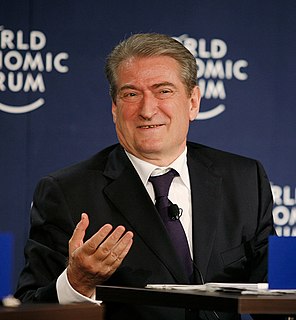
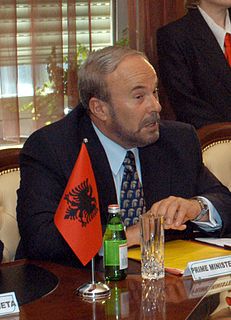
Fatos Thanas Nano
The Socialist Party of Albania, is a social-democratic political party in Albania; it gained power following the 2013 parliamentary election. The party seated 66 MPs in the 2009 Albanian parliament. It achieved power in 1997 following a political crisis and governmental realignment. At the 2001 parliamentary election the party secured 73 seats, which enabled it to form a government. At the general election of 3 July 2005, the Socialist Party lost its majority and the Democratic Party of Albania (PD) formed the new government, having secured, with its allies, a majority of 81 seats.

The Republican Party of Albania is a national-conservative political party in Albania. It currently holds no seats in the Parliament of Albania.

Pro-Europeanism, sometimes called European Unionism, is a political position that favours European integration and membership of the European Union (EU). It includes European federalists, who seek to create a federal European Union known informally as a United States of Europe. A related term is ’Europhile’.

The Party of Labour of Albania (PLA), sometimes referred to as the Albanian Workers' Party (AWP), was the vanguard party of Albania during the communist period (1945–1991) as well as the only legal political party. It was founded on 8 November 1941, as the Communist Party of Albania, but its name was changed in 1948. In 1991, the party was succeeded by the Socialist Party of Albania. For most of its existence, the party was dominated by its First Secretary, Enver Hoxha, who was also the de facto leader of Albania.

The Democratic League of Kosovo is one of the three largest political parties in Kosovo, alongside its longtime rival, the Democratic Party of Kosovo, & Vetevendosje.
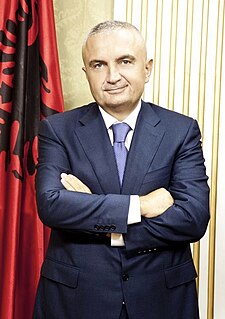
Ilir Meta is an Albanian politician, serving as President of Albania since 24 July 2017. Previously he served as Prime Minister from 1999 to 2002, and at age 30 he is the second youngest prime minister in Albanian history after Zog I who was 27 at the time of his election in 1922. Meta also served as Minister of Foreign Affairs from 2002 to 2003 and again from 2009 to 2010. He was Chairman of the Parliament of Albania from 2013 to 2017. Meta also held positions as Deputy Prime Minister and Minister of Economy, Trade, and Energy. Prior to that, he held the Chairmanship of the Parliamentary Commission of European Integration. Meta founded the Socialist Movement for Integration (LSI) in 2004.

The Socialist Movement for Integration is a social-democratic political party in Albania. The LSI was formed on 6 September 2004 when Ilir Meta, former Prime Minister of Albania, broke from the Socialist Party of Albania (PS). Through the use of the term "movement", LSI attempts to give the message that it is open and inclusive. The other reason for using this term is its intention to differentiate itself from the other parties. LSI employed the one member, one vote system in March 2005 to elect its leader, Ilir Meta.

Bashkim Fino is an Albanian socialist politician who served as the 29th Prime Minister of Albania.

The current Constitution of Montenegro was ratified and adopted by the Constitutional Parliament of Montenegro on 19 October 2007 in an extraordinary session by achieving the required two-thirds supermajority of votes. The Constitution was officially proclaimed as the Constitution of Montenegro on 22 October 2007. This Constitution replaced the Constitution of 1992.
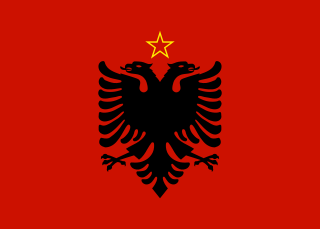
Albania, officially the People's Socialist Republic of Albania, was ruled by a Marxist-Leninist government from 1946 to 1992. From 1944 to 1946, it was known as the Democratic Government of Albania and from 1946 to 1976 it was known as the People's Republic of Albania.

Lulzim Basha is an Albanian conservative politician who was Mayor of Tirana, the capital of Albania, from 2011 to 2015. He has also been leader of the Democratic Party of Albania, the main opposition party, since 2013.
The fall of Communism in Albania, the last such event in Europe outside the USSR, started in earnest in December 1990 with student demonstrations in the capital, Tirana, although protests had begun earlier that year in other cities such as Shkodra and Kavaja. The Central Committee of the communist Party of Labour of Albania allowed political pluralism on 11 December and the largest opposition party, the Democratic Party, was founded the next day. March 1991 elections left the Party of Labour in power, but a general strike and urban opposition led to the formation of a "stability government" that included non-communists. Albania's former communists were routed in elections in March 1992 amid economic collapse and social unrest, with the Democratic Party winning most seats and its party head, Sali Berisha, becoming president.
In 1991, the Socialist Party of Albania, with specific social democratic ideology took control of the country through democratic elections. One year later the Democratic Party of Albania won the new elections. After 1990, Albania has been seeking a closer relationship with the West. What followed were deliberate programs of economic and democratic reform, but Albanian inexperience with capitalism led to the proliferation of pyramid schemes – which were not banned due to the corruption of the government. Chaos in late 1996 to early 1997, as a result of the collapse of these pyramid schemes, alarmed the world and prompted the influx of international peacekeeping forces. In 1995, Albania was accepted into the Council of Europe and requested membership in NATO and is a potential candidate country for accession to the European Union. The workforce of Albania has continued to emigrate to Western countries, especially Greece and Italy.
Parliamentary elections were held in Albania on 24 June 2001. The result was a victory for the ruling Socialist Party of Albania, which won 73 of the 140 seats, resulting in Ilir Meta remaining Prime Minister. Voter turnout was 53.6%.

Parliamentary elections were held in Albania on 28 June 2009. No alliance achieved 71 deputies on its own needed to form a parliamentary majority. A coalition government was formed by the Democratic Party and Socialist Movement for Integration.
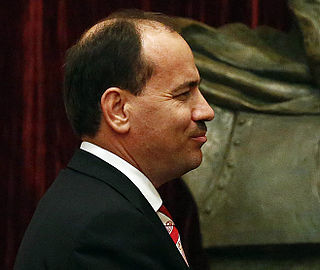
Indirect presidential elections were held in Albania on 30 May, 4, 8 and 11 June 2012, the seventh such elections since the collapse of the communist regime in 1991. The first through third rounds of voting were inconclusive. The fourth round resulted in the incumbent party's member Bujar Nishani being elected as President.

Parliamentary elections were held in Albania on 25 June. They had initially been scheduled for 18 June, but after a possible boycott was announced by opposition parties during a political crisis that lasted three months, an agreement was reached between all parties on 18 May to change the date. The Socialist Party won 74 of the 140 seats.
References
- ↑ "Parliamentary group". pd.al.